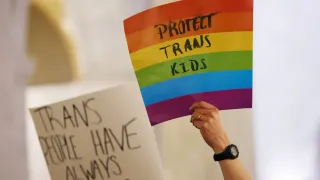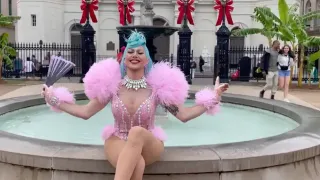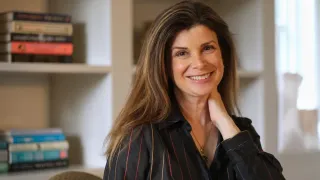January 28, 2022
'Tiger King' Joe Exotic Resentenced to 21 Years in Prison
Jill Bleed and Sean Murphy READ TIME: 2 MIN.
A federal judge resentenced "Tiger King" Joe Exotic to 21 years in prison on Friday, reducing his punishment by just a year despite pleas from the former zookeeper for leniency as he begins treatment for cancer.
"Please don't make me die in prison waiting for a chance to be free," he told a federal judge who resentenced him on a murder-for-hire charge.
Joe Exotic – whose real name is Joseph Maldonado-Passage – was convicted in a case involving animal welfare activist Carole Baskin. Both were featured in Netflix's "Tiger King: Murder, Mayhem and Madness."
Wearing an orange prison jumpsuit, Maldonado-Passage still had his trademark mullet hairstyle, but the bleach-blonde was fading to gray.
Baskin and her husband also attended the proceedings, and she said she was fearful that Maldonado-Passage could threaten her.
"He continues to harbor intense feelings of ill will toward me," she said.
Friday's court proceedings came about after a federal appeals court ruled last year that the prison term he's serving on a murder-for-hire conviction should be shortened.
Supporters packed the courtroom, some wearing animal-print masks and shirts that read "Free Joe Exotic." His attorneys said they would appeal both the resentencing and petition for a new trial.
The former zookeeper was sentenced in January 2020 to 22 years in prison after he was convicted of trying to hire two different men to kill Baskin. A three-judge panel of the 10th U.S. Circuit Court of Appeals agreed with Maldonado-Passage that the court should have treated them as one conviction at sentencing because they both involved the same goal of killing Baskin, who runs a rescue sanctuary for big cats in Florida and had criticized Maldonado-Passage's treatment of animals.
Prosecutors said Maldonado-Passage offered $10,000 to an undercover FBI agent to kill Baskin during a recorded December 2017 meeting. In the recording, he told the agent, "Just like follow her into a mall parking lot and just cap her and drive off." Maldonado-Passage's attorneys have said their client – who once operated a zoo in Wynnewood, Oklahoma, about 65 miles (105 kilometers) south of Oklahoma City – wasn't being serious.
Maldonado-Passage, who maintains his innocence, also was convicted of killing five tigers, selling tiger cubs and falsifying wildlife records.
___
Bleed reported from Little Rock, Arkansas.






